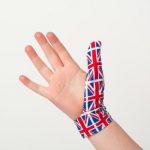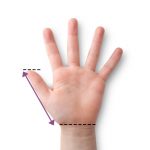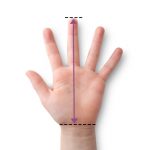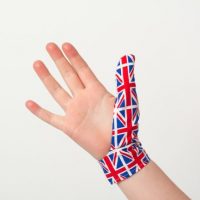Why do children suck their thumbs? It’s a question many parents have asked over the years. Our blog explains that thumb sucking is a natural reflex with both physiological and physical factors and offers some suggestions on how to stop.
We all know that parenting is a difficult job, and it is natural to have concerns about our child’s development and growth. One of the most common concerns facing parents is children thumb sucking. The good news is that thumb sucking is both a natural reflex and something that can be managed with the right support. At Thumbsie®, we are proud to design and manufacture toddler and children’s thumb guards to help kick this habit.
Why do children suck their thumbs?
- Natural Reflex
It is important for parents to know that childhood thumb sucking is perfectly natural.
International research from organisations such as the American Dental Association and the British Orthodontic Society shows that thumb sucking can often start in the womb as a means of providing comfort and security. One reason for this is that a “sucking motion” is commonplace for a child when they are hungry. Although this motion is most noticeably used when a child wants to be fed, it can also manifest itself in thumb sucking.
- Learned Habit
As a child grows, the world can seem confusing, full of new surroundings, people and places. Thumb sucking can continue to provide a feeling of security and comfort as a child navigates a new experience or new environment. Children can also develop a need to suck their thumbs before bed to help them settle or when they need soothing. Between the ages of 7 and 11, one in every eight children in the UK are believed to have developed a thumb sucking habit.
Should I be concerned about my child’s thumb sucking?
There are two main reasons to monitor a child’s thumb sucking.
On a short-term basis, there is the worry that germs can be transferred directly from hands to mouth – particularly concerning after a child has been playing outside, for example or in this current pandemic.
The longer-term concern is that unchecked thumb sucking can have a lasting impact on oral health. The British Orthodontic Society notes that the development and placement of teeth can be impacted by thumb sucking, as can jaw development. Speech and language therapists, meanwhile, have stated that thumb sucking can limit speech and language development; a child who is excessively sucking their thumb may limit their ability to practise speaking.
How can I stop my children thumb sucking?
The NHS recommends avoiding the use of dummies for all children over 12 months old.
Common methods for helping a child stop thumb sucking are encouragement, a rewards system or even the intervention of a medical professional such as a dentist.
At Thumbsie®, we believe we have found an alternative, child-friendly and highly effective solution. We produce a thumb guard which helps to easily break the thumb sucking habit and ensure that long term dental problems are avoided.
A thumb sucking guard is a fabric thumb protector which fits over a child’s thumb like a glove and prevents thumb sucking. The guard is secured around the wrist with Velcro, comes in 5 different sizes, over 40 possible fabrics and has a simple measuring guide. The guard is suitable for boys and girls from 3 years and older and is designed to be totally unrestrictive. Children can continue to play, draw or write while wearing their Thumbsie® guard. You’ll be pleased to know that the Thumbsie® guard has a demonstrable record of stopping thumb sucking and has been endorsed by parents and medical experts from around the world.
Our products are created with children in mind and feature a range of child friendly designs from unicorns to mermaids to racing cars and diggers.
With over seven years of industry experience and having won multiple awards, our founder Jo Bates has developed a means of helping children to have fun and feel secure whilst breaking their thumb sucking habit for good.
Please note all comments will need to be approved before appearing on this page. Please respect others when posting.
































Comments